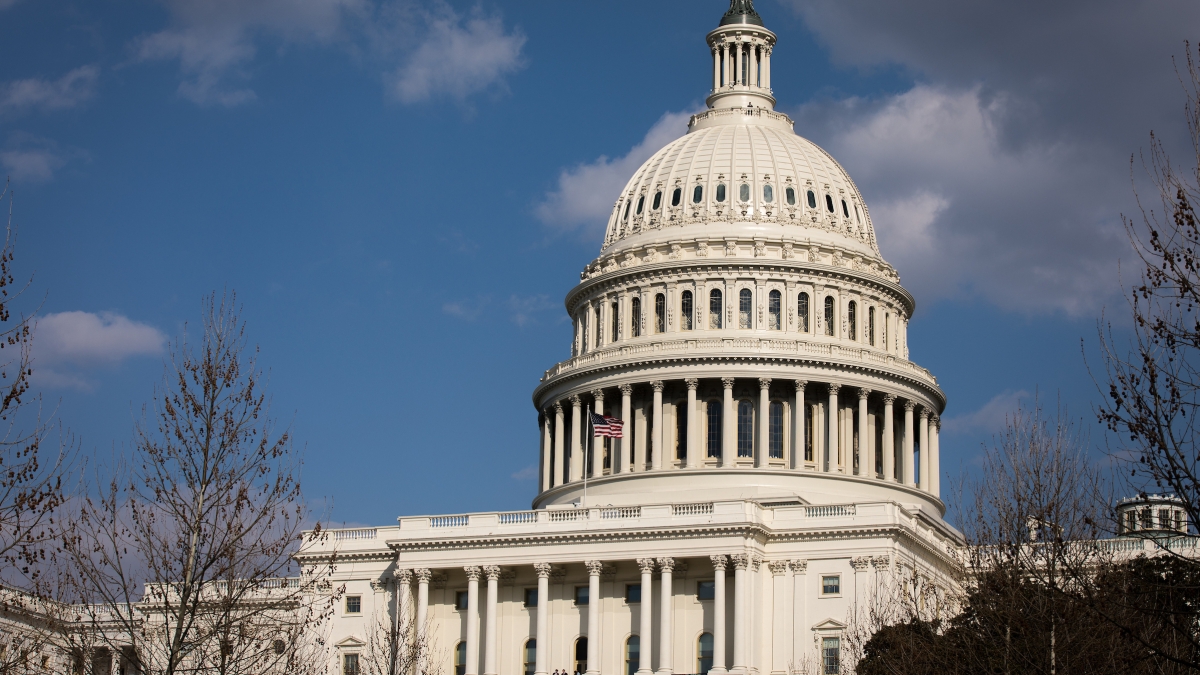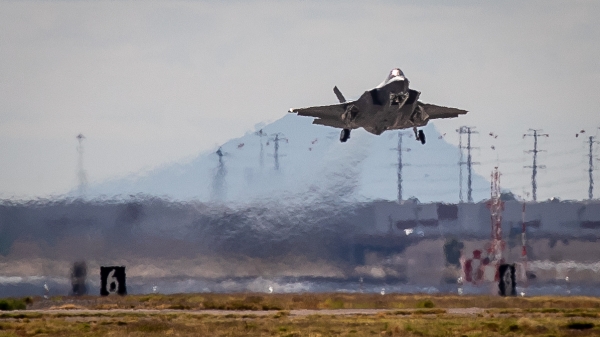Research Engagement Office helps connect ASU expertise with US priorities

The U.S. Capitol in Washington, D.C. Photo by Charlie Leight/ASU News
The image of a scientist working in a lab or out in the field is familiar to many. But there’s an important aspect of research that happens far from either of those locales: efforts within the halls of federal government to align Arizona State University’s work with U.S. research goals.
It’s a complex task, and for that, ASU has the Research Engagement Office, a newly refocused effort to advance the university’s research priorities in Washington, D.C.
The flow of information goes both ways — letting federal agencies know how ASU can meet their needs and informing ASU faculty of project opportunities sponsored by the federal government.
Matthew Hulver, who previously served the university in Arizona as vice president of research, now oversees those research engagement efforts as the new vice president for Knowledge Enterprise initiatives at the ASU Barrett and O’Connor Washington Center. He coordinates with federal agencies, industry partners, nongovernmental organizations, think tanks and other institutions to highlight ASU’s capabilities.
It’s a strategy to continue to increase the visibility of ASU in the nation’s capital.
The Barrett & O’Connor Washington Center, just blocks from the White House, had its grand opening in March 2018. It was intended to provide for greater engagement and visibility in issues of national importance. And it’s working.
“When I go to various places and say, ‘I'm at ASU,’ they go, ‘Oh yes.’ And it's not just about (ASU President) Michael Crow, it's about the ways that ASU is showing up,” said Rachel Levinson, the executive director of the Research Engagement Office who has been based in Washington for many years.
She has seen ASU’s profile rise from being a relatively unknown western university to an institution known for innovation. The recent appointment of Hulver will help continue that evolution.
Arizona’s congressional delegation supports the efforts.
“Having a strong presence in our nation’s capital is crucial for Arizona stakeholders,” said U.S. Rep. Debbie Lesko, “and I am glad to see ASU take the approach to ensure that they are communicating their capabilities to the federal government.”
Health, security, space among top priorities
The Research Engagement Office is focusing on health, national security, space, sustainability and technology. Examples of Hulver’s early activities include meetings with leadership of multiple institutes within the National Institutes of Health to promote ASU Health, a new initiative to improve community health outcomes.
“A lot of those conversations are going to be, ‘We think ASU is really well positioned to have impact in environmental health, for example, and from your perspective, how should we be thinking about that?’” said Hulver, who also is a professor in the College of Health Solutions and, until 2021, was executive director of the Fralin Life Sciences Institute at Virginia Tech.
“At ASU we can build and scale rapidly, so how can we meet their needs?
“We're doing the same thing in the national security space, increasing awareness of ASU’s assets such as the Global Security Initiative and the Future Security Initiative and how we are well positioned to meet the Department of Defense’s mission needs”
Hulver’s background in health research is important, Levinson said.
“Another element that is increasing visibility is the investment that the university is putting into infrastructure in support of ASU Health,” she said. “When we're having meetings with leaders at NIH, for example, those kinds of activities are important to get in the door.”
Also boosting ASU’s reputation have been the many large-scale federal funding awards, Hulver said, including $90.8 million from the National Science Foundation for the world’s first compact X-ray free electron laser, up to $70 million from the Department of Energy for the Clean Energy Manufacturing Innovation Institute, nearly $40 million from the Department of Defense for the Southwest Advanced Prototyping (SWAP) Hub and $15 million from the National Science Foundation for the Southwest Sustainability Innovation Engine.
“A presence in the nation’s capital provides a unique strategic position for shaping science and innovation policy, advancing institutional priorities with policymakers and federal agencies, and a key platform to elevate the contributions of public research universities to society,” said Craig Lindwarm, senior vice president of governmental affairs at the Association of Public and Land-grant Universities (APLU).
Engagement that leads to action
The team will work closely with other ASU units such as Corporate Engagement and Strategic Partnerships, the ASU Foundation and the ASU Office of Government and Community Engagement, which engages with federal and state elected officials and policymakers.
“It is crucial that we connect what is happening with federal agencies and other partners to policymakers on Capitol Hill,” said Matthew Simon, associate vice president for state and federal relations in the Office of Government and Community Engagement.
“Having the Research Engagement Office as a resource and brain trust to tap into is critical when advancing our priorities in Congress and educating our elected officials.”
The research engagement office’s new approach will also be more focused in its communications with faculty.
“We had a sort of ad hoc, decentralized engagement (before),” said Ira Bennett, director of faculty engagement for the office. “… Information was flying around, and some people got it and some people didn’t — now we’re building processes, learning what’s happening here in Washington and communicating that out. And then learning what’s happening in Arizona and communicating that to D.C.”
Hulver said the point of all of the engagement and convening in Washington, D.C., is to lead to action on complex society challenges.
“It's not just getting together and talking. It’s about bringing together the necessary mix of stakeholders, including federal agencies, policymakers, industry, community members and academia, and coming out with actionable steps that can be taken,” he said.
“There are many other universities with a presence in Washington, D.C., but I think having a team like ours that is intensely focused on strategically aligning the university’s assets to the nation’s most pressing challenges, and at the same time pursuing all imaginable resource streams, partnerships and collaborations to advance our impacts is unique and innovative. ”
How faculty can connect with the ASU Research Engagement Office
If you are an ASU faculty member or affiliate, please reach out with questions to Ira Bennett at Ira.Bennett@asu.edu. For all other inquiries, please contact Moriah Locklear at Moriah.Locklear@asu.edu.
More Local, national and global affairs

Environmental writer, ER doctor address violence, climate change, more at sold-out ASU event
“The difficulty of understanding the consequences of heat is amplified by conventional notions of what it means to be hot. In pop culture, hot is sexy, hot is cool, hot is new…” That excerpt was…

Thunderbird at ASU, AUK student appointed as Ukraine’s deputy minister of education and science
Nadiia Kuzmychova, a student in the Master of Leadership and Management (MLM) program at Thunderbird School of Global Management at Arizona State University and the American University…

ASU creates pathways to public service careers for military students
The School of Public Affairs at Arizona State University is making careers in public service easier to access for military students.Next year, the school will start holding graduate courses on site…